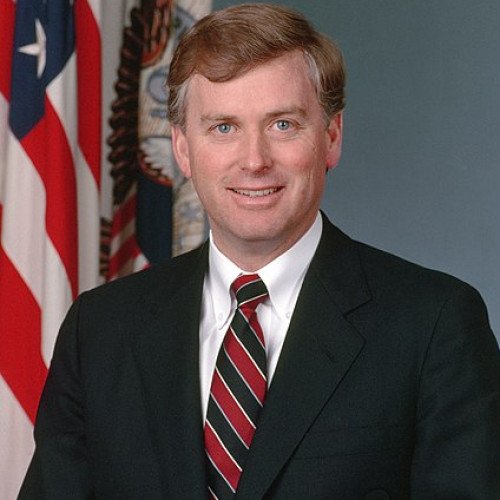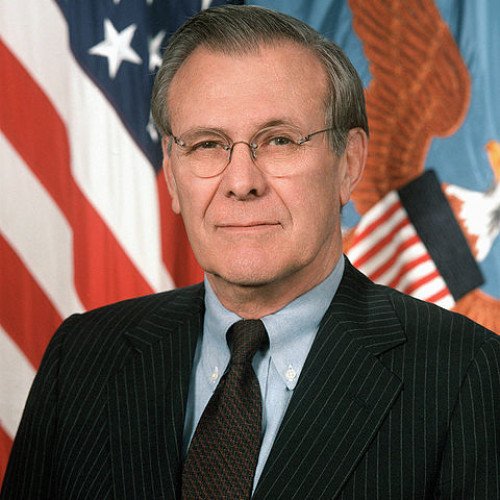Dan Quayle VS Donald Rumsfeld

Dan Quayle
James Danforth Quayle (; born February 4, 1947) is an American politician and lawyer who served as the 44th vice president of the United States from 1989 to 1993. Quayle was also a U.S. representative from 1977 to 1981 and a U.S. senator from 1981 to 1989 from the state of Indiana. A native of Indianapolis, Indiana, Quayle spent most of his childhood in Paradise Valley, a suburb of Phoenix, Arizona. He married Marilyn Tucker in 1972 and obtained his J.D. degree from the Indiana University Robert H. McKinney School of Law in 1974. Quayle practiced law in Huntington, Indiana, with his wife before his election to the United States House of Representatives in 1976. In 1980 Quayle was elected to the U.S. Senate. In 1988, Vice President and Republican presidential nominee George H. W. Bush chose Quayle as his running mate. Quayle's vice presidential debate against Democratic candidate Lloyd Bentsen was notable for the "Senator, you're no Jack Kennedy" incident. The Bush/Quayle ticket won the 1988 election over the Democratic ticket of Michael Dukakis and Bentsen, and Quayle became vice president in January 1989. As vice president, he made official visits to 47 countries and was appointed chairman of the National Space Council. He secured re-nomination for vice president in 1992, but Democrat Bill Clinton and his running mate, Al Gore, defeated the Bush/Quayle ticket. In 1994 Quayle published his memoir, Standing Firm. He declined to run for President in 1996 because he was suffering from phlebitis. Quayle sought the Republican presidential nomination in 2000 but later withdrew from the campaign and supported the eventual winner, George W. Bush. He joined Cerberus Capital Management, a private equity firm, in 1999.
Statistics for this Xoptio

Donald Rumsfeld
Donald Henry Rumsfeld (born July 9, 1932) is a retired American politician. Rumsfeld served as Secretary of Defense from 1975 to 1977 under Gerald Ford, and again from January 2001 to December 2006 under George W. Bush. He is both the youngest and the second-oldest person to have served as Secretary of Defense. Additionally, Rumsfeld was a three-term U.S. Congressman from Illinois (1963–69), director of the Office of Economic Opportunity (1969–70), counsellor to the president (1969–73), the United States Permanent Representative to NATO (1973–74), and White House Chief of Staff (1974–75). Between his terms as Secretary of Defense, he served as the CEO and chairman of several companies. Born in Illinois, Rumsfeld attended Princeton University, graduating in 1954 with a degree in political science. After serving in the Navy for three years, he mounted a campaign for Congress in Illinois's 13th Congressional District, winning in 1962 at the age of 30. While in Congress, he was a leading co-sponsor of the Freedom of Information Act. Rumsfeld reluctantly accepted an appointment by President Richard Nixon to head the Office of Economic Opportunity in 1969; appointed counsellor by Nixon and entitled to Cabinet-level status, he would also head up the Economic Stabilization Program before being appointed ambassador to NATO. Called back to Washington in August 1974, Rumsfeld was appointed chief of staff by President Ford. Rumsfeld recruited a young one-time staffer of his, Dick Cheney, to succeed him when Ford nominated him to be Secretary of Defense in 1975. When Ford lost the 1976 election, Rumsfeld returned to private business and financial life, and was named president and CEO of the pharmaceutical corporation G. D. Searle & Company. He was later named CEO of General Instrument from 1990 to 1993 and chairman of Gilead Sciences from 1997 to 2001. Rumsfeld was appointed Secretary of Defense for a second time in January 2001 by President George W. Bush. As Secretary of Defense, Rumsfeld played a central role in the invasion of Afghanistan and invasion of Iraq. Before and during the Iraq War, he claimed that Iraq had an active weapons of mass destruction program; yet no stockpiles were ever found. A Pentagon Inspector General report found that Rumsfeld's top policy aide "developed, produced, and then disseminated alternative intelligence assessments on the Iraq and al Qaida relationship, which included some conclusions that were inconsistent with the consensus of the Intelligence Community, to senior decision-makers". Rumsfeld's tenure was controversial for its use of torture and the Abu Ghraib torture and prisoner abuse scandal. Rumsfeld gradually lost political support and he resigned in late 2006. In his retirement years, he published an autobiography Known and Unknown: A Memoir as well as Rumsfeld's Rules: Leadership Lessons in Business, Politics, War, and Life.